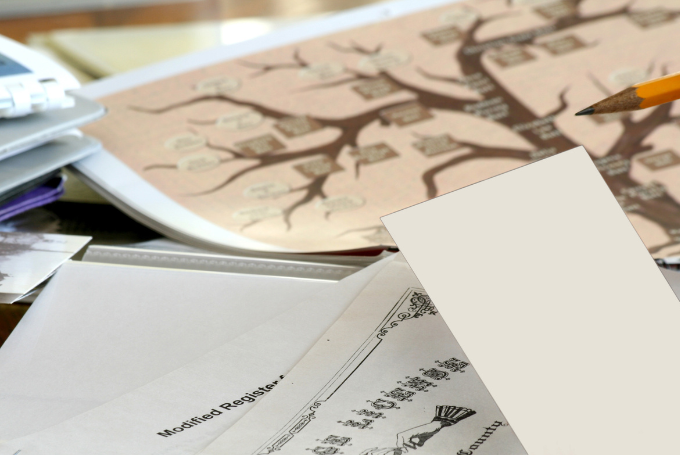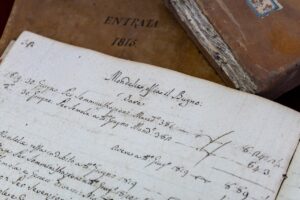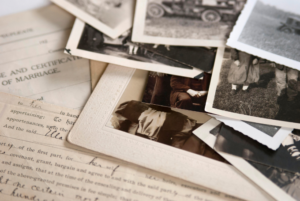You finally found out your great-grandfather’s family name and birth information, fired up your computer, and started your research adventure… Only to hit a brick wall: the small village you found seems to have vanished into thin air, or there’s a crowd of Barbieri’s born in that same town on the same day? Although this may seem discouraging at first, it’s actually a promising start to your genealogical journey. After all, you showed up, right?
Searching your family history is never an easy task. While digitalization has been a game-changer, it has also turned the world of official records and their archiving system upside down. That’s why we are here to help you stay on the right track with your research and finally find those cherished stories of your family’s past.
How to Find Out If You Are Eligible For Italian Citizenship?
Determining eligibility for Italian citizenship typically involves assessing several factors, including ancestry, residency, marriage to an Italian citizen, and similar. So, where do you begin? The official pages of the Ministry of Foreign Affairs and International Cooperation offer reliable and legally sound information. Similarly, the Italian Consulate’s official webpage within your jurisdiction provides invaluable resources to aid your search.
However, Italian citizenship is based on quite a few principles, so let’s dive into a couple of the most common ones:
Jure Matrimonii
Spouses of Italian citizens become eligible for Italian citizenship after 2 years of marriage if residing in Italy or after 3 years if living abroad. These estimated durations are cut in half if the couple has children – whether born or adopted. It is important to keep in mind that, along with standard documentation, acquiring citizenship by marriage implies providing confirmation of B1 language proficiency and a criminal record background check. Some of the prerequisites include the marriage being registered at the local Comune in Italy, or if residing abroad, the Italian spouse must have AIRE registration.
Nevertheless, there are exceptions to this type of application that follow a more simplified process. For women married to Italian men prior to April of 1983, this union might be the ticket to dual citizenship. As per Italian nationality law, a foreign woman automatically attained Italian citizenship on the date of her marriage to an Italian man if the union happened before April 26, 1983. Read more about Citizenship by Marriage here.
Jure Sanguinis
Did one of your parents hold Italian citizenship when you were born? What about your grandparents or great-grandparents at the time of their descendant’s birth?
If any of these questions stir a resounding “yes,” you could be on track to apply for Italian citizenship… As long as your Italian ancestor was alive on or after the date of Italy’s unification (March 17th, 1861) and did not naturalize prior to July 1 st , 1912 – or their descendant’s birth, of course. However, given recent changes to these conditions, we encourage you to take a moment to read our Update article for more information on how these may impact your situation. Read more about Citizenship by Descent here.
Eligibility Test
When it comes to the twists and turns of your eligibility, contacting professionals and undergoing an eligibility test with an experienced citizenship specialist might be your safest bet – just book a free Discovery Call in a matter of seconds.
Documents Required For Italian Citizenship By Descent
This is the part where it can get a bit tricky. Depending on whether you’re going through a consular or judicial process and how far back your Italian family tree stretches, your documentation needs may vary widely from someone else’s. In both cases, however, you will need vital records tracing from your Italian ancestors all the way down to yourself.
When applying for Italian citizenship, there are several common documents that every applicant typically needs to include:
- Your Italian ancestors’ birth certificates issued by the ‘Comune’ in Italy.
- Marriage certificates of your Italian ancestors, and sometimes their death certificates (if applicable), may also be required.
- In case of naturalization, a copy of the naturalization records for the Italian ancestor you’re applying through.
- If there is no naturalization, a Certificate of Non-Existence (G-1566 issued by USCIS), along with a copy of an Italian passport or official resident card documentation for the Italian ancestor you’re applying through.
- Vital records such as birth, marriage, divorce, and death certificates applicable to your entire lineage from your Italian ancestors down to yourself.
The best way to confirm these requirements is either by visiting the website of the Consulate you’ll be applying to – they usually outline everything you need – or by consulting with your trusted citizenship specialist. Sometimes, it’s just a paper or two that makes all the difference.
But what happens when you just can’t seem to find some of the listed documents, or you really need to enclose some supporting documentation to bolster your case? That’s when you don your detective glasses and tread the ‘paths less traveled’ to uncover your family history. And here are some useful trails to get started with.
Family Books
Also known as ‘Libretto Internazionale di Famiglia,’ these books refer to official family records or registers maintained by Italian authorities. As they can contain vital information about family members – such as births, marriages, and sometimes deaths, they serve as important documentation when proving family relationships and lineage. If you are looking for seemingly difficult Italian records, requesting the family book could be a promising alternative to explore.
Census Records
These records play a significant role when applying for dual Italian citizenship, as they include valuable information such as names, ages, occupations, and places of residence – all essential for establishing lineage and proving Italian ancestry. Along with draft cards and passenger listings, these census lists often slot your ancestors into specific times and places, conveniently placing them just where you need them to prove your lineage. Census records are often used as supporting documentation when proving identity, as some of the older naturalization records might not have all relevant personal information registered.
Naturalization Records
Naturalization records detail the process through which an ancestor either renounced or acquired citizenship in another country, potentially impacting their Italian citizenship status. They are the key documents in your citizenship puzzle. Even if your ancestor never naturalized, you’ll still want to grab these records.
For example, if your ancestor became a U.S. citizen, you will need to dig up their naturalization records – more precisely, their Declaration of Intention, Petition for Naturalization, and the Certificate of Naturalization. While the first two can commonly be found in the National Archives, the Certificate of Naturalization needs to be issued by the United States Citizenship and Immigration Services (USCIS).
If your ancestor, however, never became, in this case, a U.S. citizen, you still need to procure proof, known as the Certificate of Non-existence of Records, from USCIS to verify their non-naturalization status.
Birth Certificate
Birth certificates are the foundation of our ancestry journey and can be found in vital records offices, both online and offline, along with the towns or counties where your Italian ancestors were born.
It is not uncommon to stumble upon slight discrepancies in these records, but it can get difficult to assess whether these discrepancies are affecting your application process. If you spot any inconsistencies, it’s best to address them head-on. Sometimes, it is just a matter of a misspelled name or a small mix-up in personal details. But to set the record straight, it is wise to reach out to a professional, as they’ll help you assess the situation and ensure everything aligns smoothly!
Marriage Certificate
These certificates are extremely important when proving your family connection and eligibility for dual citizenship, as they help demonstrate the relationship between the applicant and their Italian ancestor who might have married outside of Italy.
When obtaining these records from the vital offices, towns, or counties mentioned earlier, it’s essential to distinguish between a marriage certificate and a marriage license. Together, these documents complete the necessary documentation for your journey. While the marriage license serves as the initial authorization for a couple to marry legally, the marriage certificate is the official record issued post-ceremony, confirming the marriage’s legality. You can now see why securing both documents is a good idea.
Divorce Records
If subsequent marriages are involved, obtaining divorce records for citizenship applicants is paramount. These records serve as tangible proof of the dissolution of previous marriages, ensuring the legality of subsequent ones. Just as with marriage certificates, divorce records also consist of two important yet separate parts: the detailed documentation of the divorce proceedings, also known as the divorce records, and a Certificate of No Appeal, which attests that there are no pending legal appeals against the divorce decree. These records can typically be ordered from the relevant court where the divorce was finalized, and you’ve guessed it right – it is best if you get both of the documents.
Death Certificate
Obtaining death certificates for our ancestors serves as vital proof of their passing. Besides providing important information such as the date and place of death, they help us provide a clear timeline of family history, demonstrating connections between generations. Just as birth and marriage certificates, these records can be obtained from the vital records office in the jurisdiction where the individual passed away.
How To Check If You Qualify For Italian Citizenship?
After diving into the Ministry of Foreign Affairs pages, you might sense that you are on the brink of qualifying for Italian citizenship. The only missing step is uncovering, for example, your great-grandfather’s date of birth. Where do you begin digging? Luckily, the digital realm offers plenty of online genealogy resources perfect for your family history research.
Online Forums and Communities
Websites like ItalianGenealogy.com and Genealogy.com offer discussion forums where individuals share research tips and exchange information. Plenty of Facebook groups dedicated to the same topics provide useful insights and support as you navigate your genealogical journey.
Ancestry Websites
Platforms like Ancestry.com, MyHeritage, and FamilySearch offer extensive collections of historical records, including census data, birth and death records, immigration records, and many more. These resources will quickly become your go-to tools when it comes to researching your ancestors based on various criteria and helping you trace your family lineage back through generations.
Italian Civil Records
Many Italian municipalities have digitalized their civil registration records and made them available online. Websites such as Antenati (meaning ‘ancestors’ in Italian) provide access to a rich repository of birth, marriage, and death records from different regions in Italy.
Check Your Eligibility For Italian Citizenship Online
We have said it before, and we will say it now – your dedication to uncovering your family history is commendable. But even we, as seasoned professionals, sometimes face obstacles that can get quite surprising – such as new laws and decisions directly affecting seemingly straightforward eligibility criteria. However, as a team, we’re adept at surmounting these obstacles and clearing the path forward.
Certainly, you have the capability to navigate this journey independently. But why go alone when support is readily available? With just a few clicks, you can visit our website and schedule your complimentary Discovery Call, where you will gain professional guidance on your road to an Italian passport.
La Dolce Vita is here to empower your journey, but at the end of the day – you are the one to make the call.





